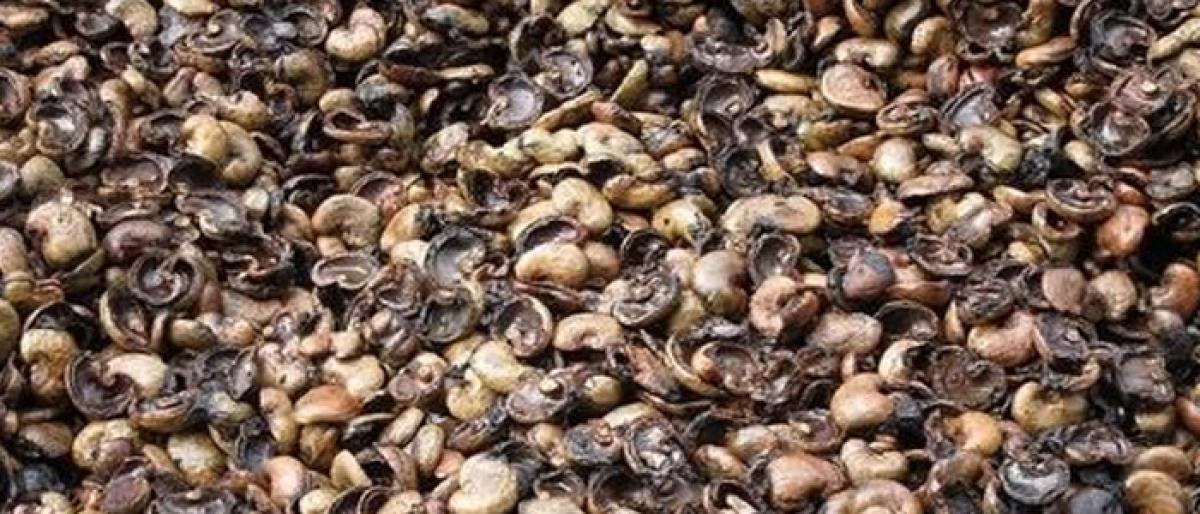Live
- After meeting HM Amit Shah in Delhi, Mahayuti leaders to huddle in Mumbai
- Shabana Azmi remembers her late ‘fun-loving mother’ with a heartfelt post
- Garena Free Fire MAX Redeem Codes for November 29, 2024: New Rewards for Players
- First Round of NEET PG medical counseling completed at NTR Health University
- Directorate General of Hydrocarbons, IIT Bombay to foster R&D in decarbonising petroleum sector
- Too late for Western Australian residents to leave as bushfire threatens towns: Fire department
- Two IEDs recovered by security forces in J&K’s Poonch
- PM Modi to reach Bhubaneswar today on three-day Odisha visit
- Military rule on the rise in Africa
- Hrithik, NTR Jr. to have a 15-day climax shoot for ‘War 2’ in Mumbai
Just In

Wealth can be created from waste. Waste generation is normal in all agriculture commodities’ processing except in exceptional items such as coconut. Coconut fibre is used in coir industry, shell powder for paints, coconut water to quench thirst – export oriented – and finally copra for extraction of coconut oil.
Wealth can be created from waste. Waste generation is normal in all agriculture commodities’ processing except in exceptional items such as coconut. Coconut fibre is used in coir industry, shell powder for paints, coconut water to quench thirst – export oriented – and finally copra for extraction of coconut oil.
Andhra Pradesh Food Processing Society (APFPS), nodal agency for implementing Food Policy, conceptualised a scheme to ensure utilisation of waste generated by agro processing industries. Name is ‘Scheme for units set up to process waste produced in FP units in Identified clusters.’
Waste scheme has not attracted attention of entrepreneurs adequately and ‘Waste Scheme’ has gone to a total waste till date.
Let us see how business opportunities are lost.
Cashew fruit
Cashew production is predominant in backward districts – Vizianagaram and Srikakulam. Cashew fruit, typically discarded by most cashew farmers, is high in nutritional value. It is rich in potassium and contains as much as five times vitamin C of an orange and 50 times vitamin C of an apple. PepsiCo is on way to create a soft drink from traditional waste product - juice from cashew fruit. Normally, farmers waste cashew fruit in soil.
A herculean challenge is timely collection of cashew fruit and juice extraction as fruit shelf life is low.
Setting up a unit in adjoining cashew production areas provides opportunity to earn high margins. Surprisingly, no unit has come up in these districts. It is a good business idea to extract pulp from cashew fruit, with market tie up like Pepsi.
Cashew nut shell oil
Many cashew processing units have come up. Cashew nut shells are agro-wastes produced from these units, containing about 30–35 wt% oil called cashew nut shell liquid (CNSL). However, cashew nut shell oil manufacturing units are very few.
Scheme hurdles
APFPS has introduced cluster approach for waste scheme. For the aforementioned backward districts, mango and cashew only have been identified under waste scheme. This restrictive approach is the primary hurdle.
Ground realities
Just see how this restrictive approach works. Corn maize is produced plenty in Andhra Pradesh, which is at number two after Karnataka. Maize corn is a dry land crop with bumper production in Vizianagaram and Srikakulam districts. However, corn has not been identified as eligible sector in scheme.
Cluster approach
The authorities may contend that the Food Policy aims to develop commodity-based clusters to develop food processing industry. Development of agro processing industries cluster-wise has relevance but not in respect of waste produced by those industries. Presently, agro –processing waste is used as fuel in industries or burnt on fields indiscriminately. Before Andhra Pradesh becomes Delhi in pollution, an out-of-box approach is required urgently.
Agro waste is waste, wherever created. Allow any willing entrepreneur to start any unit with agro-waste anywhere in Andhra Pradesh and State should be a real role model in ‘ease of doing business.’ At least, give the choice of agro process waste and location to entrepreneur, who is a better judge to decide economic viability.
Excellent Subsidy
Waste scheme offers Grant-in-Aid benefit which benefit is 50% on buildings and machinery, subject to a maximum of Rs 200 lakh. Many are not aware subsidy is not refundable to the government. Despite this excellent benefit, apart from interest benefit of 7% on term loan amount for all most six years period, why has this not attracted the attention of even a single entrepreneur?
Coconut Waste
We see lot of coconuts, after drinking coconut water, thrown at many shop corners waiting to be picked up by municipality. Under current rules, those waste coconuts may not be qualified under the government waste scheme as they are not generated by food processing industries, main requirement. Waste is a waste, however going waste.
State as a facilitator
State has to turn agro producers into agro entrepreneurs. Aspiring entrepreneurs often enquire who would buy their processed products. There is a wide gap between village and industry, presently, to be filled in through facilitators. State has to act like a facilitator, linking both, say Pepsi with cashew fruit pulp entrepreneurs.
Allow agro processing waste produced by food processing industries (FPIs) or generated from horticulture, anywhere in state, to become eligible as long as that waste is put to productive use. Look to the end-objective and make a wise step forward in the ‘Ease of Doing Business’ both in letter and spirit, equally.
By: C Rama Gopal
(Writer is an agro processing consultant at Vizianagaram)

© 2024 Hyderabad Media House Limited/The Hans India. All rights reserved. Powered by hocalwire.com







